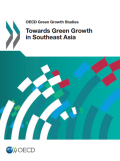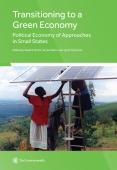This policy brief looks at the impacts of environmental regulations on regulated companies. It presents an overview of what competitiveness means, at the level of firms, sectors and countries; and explains how competitiveness effects occur, why it is important to assess them and how they are measured. The main focus of the policy brief is a review of the exisiting evidence. The authors focus on ex post evaluation studies. Ex ante modelling studies are not included. They discuss the impact of environmental regulations on productivity, employment, trade, industry location and innovation. And they conclude by discussing what the literature teaches about improving environmental regulations and identifying priorities for future research.
Key findings from the policy brief include:
In the first dispute on renewable energy to come to World Trade Organization (WTO) dispute settlement, the domestic content requirement of Ontario’s feed-in tariff was challenged as a discriminatory investment-related measure and as a prohibited import substitution subsidy. The panel and Appellate Body agreed that Canada was violating the GATT and the TRIMS Agreement. But the SCM Article 3 claim by Japan and the European Union remains unadjudicated, because neither tribunal made a finding that the price guaranteed for electricity from renewable sources constitutes a ‘benefit’ pursuant to the SCM Agreement. Although the Appellate Body provides useful guidance to future panels on how the existence of a benefit could be calculated, the most noteworthy aspect of the new jurisprudence is the Appellate Body’s reasoning that delineating the proper market for ‘benefit’ analysis entails respect for the policy choices made by a government. Thus, in this dispute, the proper market is electricity produced only from wind and solar energy.

This report documents the scale and structure of fossil fuel exploration subsidies in the G20 countries. The evidence points to a publicly financed bailout for carbon-intensive companies, and support for uneconomic investments that could drive the planet far beyond the internationally agreed target of limiting global temperature increases to no more than 2ºC. It finds that, by providing subsidies for fossil fuel exploration, the G20 countries are creating a ‘triple-lose’ scenario. They are directing large volumes of finance into high-carbon assets that cannot be exploited without catastrophic climate effects. They are diverting investment from economic low-carbon alternatives such as solar, wind and hydro-power. And they are undermining the prospects for an ambitious climate deal in 2015.
The analysis in this report focuses on selected production-consumption systems, which link environmental, social and economic systems across the world - generating earnings, supporting ways of living, and meeting consumer demands - and also account for much of humanity's burden on the environment. production and consumption are addressed together because they are highly interdependent. Only by adopting an integrated perspective is it possible to get a full understanding of these systems: the incentives that structure them, the functions they perform, the ways system elements interact, the impacts they generate, and the opportunities to reconfigure them.
The New Zealand Green Growth Research Trust (NZGGRT) commissioned this report to support its thinking on how to grasp important opportunities that would improve the wellbeing of New Zealanders. These are opportunities to enhance New Zealand’s economic prosperity while raising environmental quality that might otherwise be missed through lack of action, leadership or understanding. The report investigates the possible opportunities for New Zealand that could arise from a global shift to green growth, and identifies 21 valuable, feasible actions that New Zealand could take to help realise these opportunities. The report focuses on six important sectors across the trade-focused and the domestic economy. The analysis reveals green growth opportunities in each sector that have both direct environmental benefits as well as important co-benefits such as higher productivity, lower energy bills and fewer health risks.
Green economy has become one of the most fashionable terms in global environmental public policy discussions and forums. Despite this popularity, and its being selected as one of the organizing themes of the United Nations Rio+20 Conference in Brazil, June 2012, its prospects as an effective mobilization tool for global environmental sustainability scholarship and practice remain unclear. A major reason for this is that much like its precursor concepts such as environmental sustainability and sustainable development, green economy is a woolly concept, which lends itself to many interpretations. Hence, rather than resolve long-standing controversies, green economy merely reinvigorates existing debates over the visions, actors and policies best suited to secure a more sustainable future for all. In this review article, the authors aim to fill an important gap in scholarship by suggesting various ways in which green economy may be organized and synthesized as a concept, and especially in terms of its relationship with the idea of social and environmental justice.
Questions of justice in the transition to a green economy have been raised by various social forces. Very few proposals, however, have been as focused and developed as the “just transition” strategy proposed by global labour unions. Yet, labour unions are remarkably absent from discussions of the transition towards a green economy. This is surprising as labour unions are arguably the largest organizations in the world fighting for basic rights and more just social relations. This paper tries to advance the potential contribution of labour unions in this arena by asking: what is the full scope of “just transition” today and how have labour unions developed and refined it over the years to render the move towards a green economy both environmentally and socially sustainable? The concept of just transition is hotly debated within labour unions and has different interpretations, and hence different strategies. The last section assesses these interpretations by means of a normative framework, which seeks to fuse political economy and political ecology. Empirically, the authors add to the growing literature on labour environmentalism, as well as transitions more generally.
This report was prepared for the G20 Development Working Group to inform the creation of a public-private G20 Dialogue Platform on Inclusive Green Investment to scale up commercially viable financial investments. The report provides a stocktaking exercise on existing innovative mechanisms to mobilize private capital for inclusive green growth investments in developing countries, and how to scale them up, including initiatives to engage institutional investors in these investments to identify best practices. The report distills key lessons learned and policy implications as the basis for strategies for attracting investment outside the G20 countries, consistent with making green growth more “inclusive”.

While the term ‘green economy’ has been widely used at the international level, very little information exists about what the concept looks like in practice. It remains to be explored what policies are required, and what the challenges of implementation at national level are.
This book contains case studies from eight small states that have committed publicly to greening their economies: Botswana, Grenada, Guyana, Jamaica, Mauritius, Nauru, Samoa and Seychelles. It provides insights into the success of various initiatives and highlights how small states themselves are making practical progress on a green economy approach.
